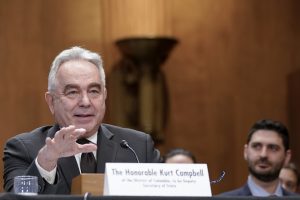The ship huddle was first spotted at Whitsun Reef last November.
More than 100 vessels linked by ropes drifted around the northern end of the Spratly Islands for days. The Philippine Coast Guard’s attempts to establish radio contact with the ships were unsuccessful. “There is no one there,” a government official told a Manila newspaper.
The Coast Guard described the incident as a “swarming” by “Chinese Maritime Militia.”
A spokesperson for China’s Foreign Ministry called the remarks “irresponsible.” Wang Wenbin told reporters at a press conference on December 4 that the vessels were fishing boats and their activities were “justified and lawful,” meaning they were operating within China’s territory.
However, an international judicial body had already ruled on the legality of Beijing’s maritime claims in the landmark 2016 case, The Republic of the Philippines v. The People’s Republic of China.
A tribunal constituted under UNCLOS, the United Nations Convention on the Law of the Sea, ruled that China’s claims based on the “nine-dash line” were “without lawful effect.” Certain disputed geographic features in the Spratly Islands, such as Second Thomas Shoal, were declared part of the Exclusive Economic Zone of the Philippines.
The Whitsun Reef spat proved to be yet another stress test for UNCLOS, the legal framework for the peaceful resolution of maritime disputes.
Can the United States, a non-signatory, play a constructive role?
Last month, the U.S. Senate confirmed Kurt Campbell as the State Department’s second-ranking diplomat. The new deputy secretary of state is a policy expert on the Indo-Pacific region and has long advocated for greater engagement with Asia.
Campbell admitted he was eager to get UNCLOS “over the finish line.”
China and the Philippines are among the 169 states that are parties to the maritime treaty. Yet the biggest importer of goods transported by sea is not part of “the constitution of the oceans.” The U.S. acknowledges that UNCLOS reflects customary international law but has yet to ratify the treaty. The main stumbling block is a long-standing objection to provisions on seabed mining.
Campbell hinted that the legislative impasse over UNCLOS had complicated diplomatic efforts in the Indo-Pacific. “Even our allies and partners say, wait a second, you are holding China to account to something you yourself haven’t signed up for?” he told the Senate Foreign Relations Committee.
In 2016, Beijing pointed out the inconsistency after a State Department official urged South China Sea countries to respect international conventions when resolving maritime disputes. “It would be better if the U.S. could ratify and join UNCLOS at an early date, as we’ve said many times. That would make them sound more convincing next time when talking about international law,” said a foreign ministry spokesperson.
However, when the UNCLOS-constituted tribunal ruled in favor of the Philippines later that year, China’s foreign ministry rejected the award, calling it “null and void.”
At the time, Campbell was chairman of the Center for A New American Security, a Washington, D.C.-based think tank. He urged senators to ratify the treaty to help “legitimize” the ruling. Campbell reminded the Senate Foreign Relations Committee that UNCLOS had the “full-throated endorsement” of top military leaders.
“We are approaching a watershed moment,” he warned.
Campbell joined the Biden Administration’s National Security Council team in 2021 as coordinator for Indo-Pacific Affairs. In that role, he helped orchestrate a series of diplomatic breakthroughs, including the Vietnam-U.S. strategic partnership deal and a trilateral summit with the leaders of Japan and South Korea.
During his confirmation hearing, Campbell remarked, “I believe that fundamentally, our long-term interests over the remainder of the century will play out largely in the Indo-Pacific.”
The Senate approved his nomination by a near-unanimous vote of 92-5.
The bipartisan nod for Campbell’s promotion is a hopeful sign for UNCLOS.

































